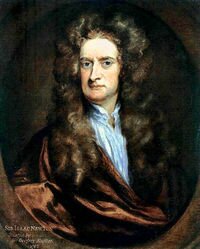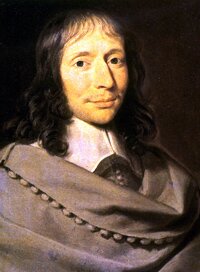Theological Dictionary word of the day: Isaac Newton
Sir Isaac Newton, (4 January 1643 – 31 March 1727) [ OS: 25 December 1642 – 20 March 1727] was an English physicist, mathematician, astronomer, natural philosopher, and alchemist, regarded by many as the greatest figure in the history of science. His treatise Philosophiae Naturalis Principia Mathematica, published in 1687, described universal gravitation and the three laws of motion, laying the groundwork for classical mechanics. By deriving Kepler's laws of planetary motion from this system, he was the first to show that the motion of objects on Earth and of celestial bodies are governed by the same set of natural laws. The unifying and predictive power of his laws was central to the scientific revolution, the advancement of heliocentrism, and the broader acceptance of the notion that rational investigation can reveal the inner workings of nature.
In mechanics, Newton also markedly enunciated the principles of conservation of momentum and angular momentum. In optics, he invented the reflecting telescope and developed a theory of colour based on the observation that a prism decomposes white light into a visible spectrum. Newton notably argued that light is composed of particles. He also formulated an empirical law of cooling, studied the speed of sound, and proposed a theory of the origin of stars. In mathematics, Newton shares the credit with Gottfried Leibniz for the development of calculus. He also demonstrated the generalized binomial theorem, developed the so-called "Newton's method" for approximating the zeroes of a function, and contributed to the study of power series.
French mathematician Joseph-Louis Lagrange often said that Newton was the greatest genius who ever lived, and once added that he was also "the most fortunate, for we cannot find more than once a system of the world to establish." English poet Alexander Pope was moved by Newton's accomplishments to write the famous epitaph:
“ Nature and nature's laws lay hid in night; God said "Let Newton be" and
all was light. ”
 Sir Frederick William Herschel, FRS KH (15 November 1738-25 August 1822) was a German-born British astronomer and composer who became famous for discovering the planet Uranus. He also discovered infrared radiation and made many other discoveries in astronomy.
Sir Frederick William Herschel, FRS KH (15 November 1738-25 August 1822) was a German-born British astronomer and composer who became famous for discovering the planet Uranus. He also discovered infrared radiation and made many other discoveries in astronomy.




